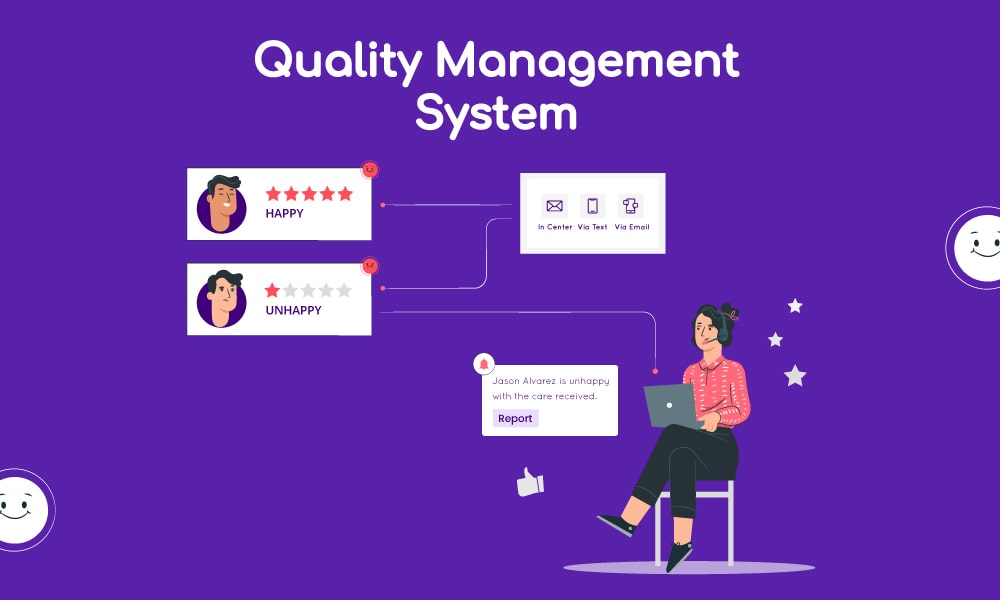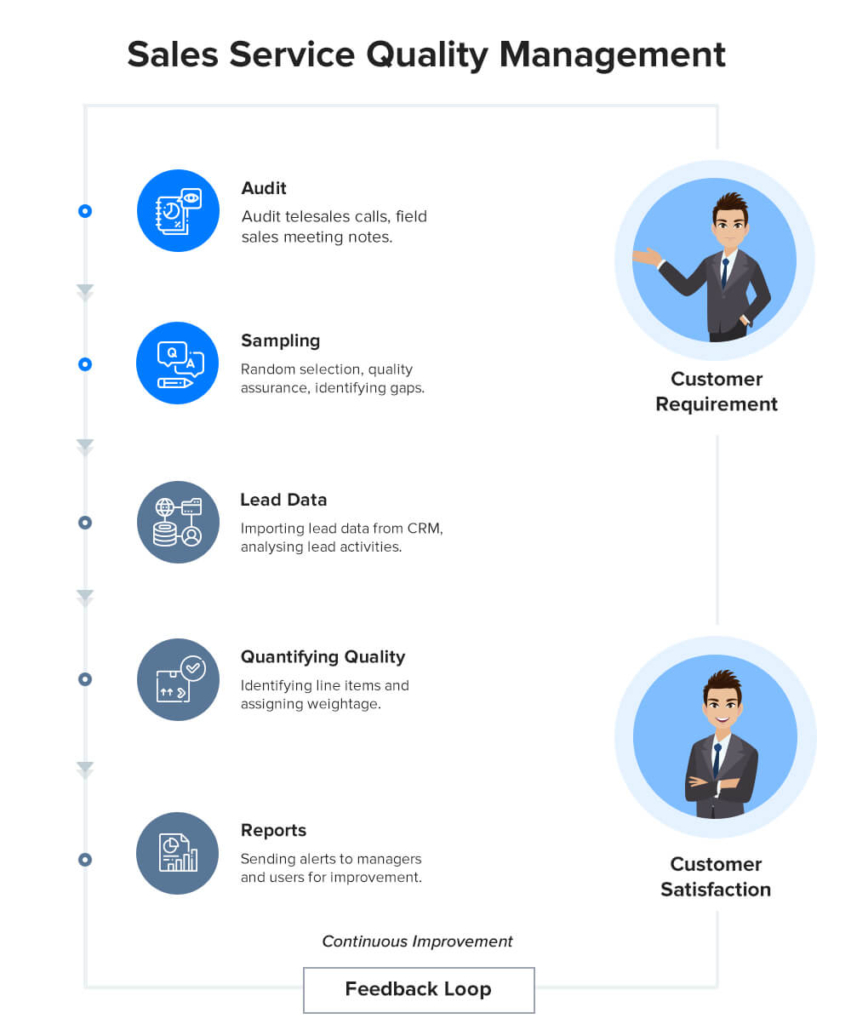The present business landscape is very competitive. Consumers have hundreds of options similar to your product or service. In such circumstances, the quality of your products can differentiate you from your competitors. Ensuring better quality can be a game-changer for your business. And this is where quality management comes into the picture.

Let’s take an example. You want to buy a smartphone. Whether you search online or visit a store, you’ll find a cluster of brands showcasing their products for every price range. Here, which one will you buy? In general, you’ll compare the quality, price, availability of service, and brand reputation to make a decision.
Quality management is a must-have asset to incline consumer decisions in your company’s favor. It ensures better products and services and helps you elevate your reputation in the market.
So here is a detailed explanation of Quality Management.
What is Quality Management?
The quality management process ensures that the quality of your product/service is as per the market standards. If you start looking at every sale/service from a human standpoint, you’ll realize why consumers chose a particular product. The quality of your sales and service processes determines whether a consumer will buy your product or competitors.
According to the PwC Future of Customer Experience Survey, 54% of consumers from the United States say that customer experience at most companies needs improvement. When it comes to making purchase decisions, consumers consider their experience with a company’s sales and services.

What is Sales Service Quality?
Sales Service Quality determines how effectively your sales agents are helping consumers with resolution requests or buying decisions. It is critical to the selling process, which often goes unnoticed in the quest for more revenue.
Let’s say a prospect is looking to buy a health insurance policy and wants to compare plans. The prospect will reach out to an insurance aggregator, where the first point of contact is a telesales agent. The agent must ask the right questions to understand the prospect’s needs. He/She will also need to know the various plans available to be able to suggest the most appropriate one. The key idea here is to make sure that the buyer gets what he needed to buy and not what the agent wants to sell. This thin line of perception can be the make or break factor.
Where does Quality Management come in?
Accepting the fact that sales service quality is essential is one half of the puzzle. To improve anything, you must evaluate it first. Quality management identifies critical touchpoints and evaluates them regularly to achieve a desired standard of excellence.

In simple words, quantifying quality corresponds to understanding which sales parameters have a lasting effect on the customer and accessing them to improve customer experience. While there are a lot of ways to get started with quality management, the best one to start with is to decode the term – quality.
Quantifying Quality
Measuring intangibles or subjective items can lead to uncertainties. To avoid this, you can try and convert an aim for better quality into measurable smaller pieces. You can achieve this in three simple steps:
Step 1: The starting point would be to identify the concerned teams. While the focus here is generally on the tele-callers and field sales executives, you can extend it to any group of sales/service personnel. When you think on the lines of “Who in my company is making an impact on the customer,” it will become easier to pick the right teams.
Step 2: After setting up the teams, the next action would be to deep dive into their daily activities and understand who has a telling effect on consumers. You can evaluate the executives based on their knowledge about the product and their communications with the prospects. Depending on the type of sale, you can assess the tone of the agent, rapport building skills, and negotiation ability.
Step 3: After identifying the line items, the final task will be to assign some weightage to each of them. Here, your understanding of “what’s most important for your end-user” will play a huge role. You must weigh each line item as per its impact on the consumer and your sales cycle. A disproportionate/incorrect weightage can potentially render the entire exercise futile.
How can a Quality Management System (QMS) add value?
A system that helps you define, manage & evaluate your quality parameters is a QMS. It is of great help to the Sales Quality Audit Team.
Generally, organizations use CRM (Customer Relationship Management) software to assign leads to sales agents. The most common method for lead allocation is Round-Robin. It involves allocating prospects to every salesperson based on defined parameters like availability, domain, location, to name some. CRMs maintain sales agents’ activities history with your leads as well as call logs and meeting notes and pass all this information to the QMS.
QMS provides separate access & view for your audit team. Once the auditors have consolidated leads’ information, their task would be to assess the quality of these activities. For example, you can check the call quality of tele-callers, meeting notes from field executives, and other touchpoints. This assessment is quantitative so that the audit managers have a solid idea of things that need improvement. Also, this is a closed feedback loop to ensure that sales agents follow the suggestions from the audit team and apply the learnings.
Center for Economic and Business Research reveals that every dollar invested in Quality Management solutions results in $16 in cost reduction. In a nutshell, you can leverage the following benefits with a Quality Management approach:
- Reduce expensive mistakes
- Optimize the use of time and resources and increase employee productivity
- Improve customer satisfaction
- Market your product/service more effectively
- Analyze your product-market fit and incorporate required enhancements
- Regularly improve your products, services, and processes.
- Utilize improvement and learnings for new-employee training.
Also read – Call-center quality assurance best practices
Do you really need one more system on top of your existing ones?
Now that you have understood the essence of quality management and the role played by a QMS, there is one final issue left to address.
Almost all organizations tend to have multiple systems to help with different areas of their business. Adding a new one – though it has immense benefits – can make the tool’s adoption quite hard and cause discomfort among the internal users. Thus, organizations are trying to leverage their existing LMS/CRM to perform quality management tasks instead of going for a dedicated QMS. It makes a lot of sense for business as it avoids the hassle of using multiple tools. It can help organizations ensure that all the teams are on one platform keeping the productivity intact. Considering not all CRMs are robust enough to act as a QMS, its crucial to choose one which can add value to your company.
Summary:
Sales service quality is crucial for building a better connection with your buyer. Once the required activities and touchpoints are identified and weighted, any sales personnel can come under the quality management umbrella. With the help of a QMS, you can achieve better sales and service quality. However, the best deal is to leverage your existing CRM for quality management.
Explore CRM with QMS
FAQs
u003cstrongu003eWhat is agile quality management?u003c/strongu003e
Agile quality management indicates the business’ priority on satisfying the customer through early and continuous delivery. The closed feedback loop is at the core of agile quality management. It ensures continuous improvement of products and services until the customer is satisfied.
What are the 7 principles of quality management?
ISO 9001:2015 outlines a series of quality standards including:
1. Customer centricity
2. Process-based approach
3. Continuous improvement
4. Evidence-based decision making
5. Relationship management
6. Customer engagement
7. Leadership
u003cstrongu003eWhat is in a Quality Management System (QMS)?u003c/strongu003e
A QMS is a formal system for accessing and processing documents, procedures, and responsibilities to achieve quality objectives.
Further reading:







